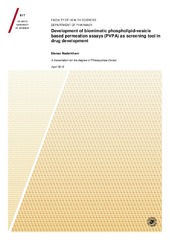Development of biomimetic phospholipid vesicle-based permeation assays (PVPA) as screening tool in drug development
Permanent link
https://hdl.handle.net/10037/7705View/
Thesis introduction (PDF)
Elenaz Naderkhani, Terje Vasskog, and Gøril Eide Flaten: 'Biomimetic PVPA in vitro model for estimation of the intestinal drug permeability using fasted and fed state simulated intestinal fluids', (manuscript) (PDF)
Date
2015-04-17Type
Doctoral thesisDoktorgradsavhandling
Author
Naderkhani, ElenazAbstract
Although several routes of administration can be utilized to bring a drug to the desired site of
action, oral administration is still the most important and prevalent route of administration, due to
its cost efficiency, convenience and patient compliance. A prerequisite for successful oral therapy
is the ability of a drug to cross the gastrointestinal barrier. Over the past two decades, the number
of new biological active chemical entities has increased due to the modern discovery programs,
often based on combinatorial chemistry and high-throughput screening. Consequently,
appropriate and reliable high-throughput in vitro models to assess the permeability of new drug
candidates and drug formulations are required to increase the success rate and to reduce the time
and cost for development. The phospholipid vesicle-based permeation assay (PVPA) is an in
vitro permeability model consisting of a tight layer of liposomes immobilized on a filter that
successfully has been used to test novel active substances and formulations. The first part of this
thesis was to employ the PVPA for the first time as a screening tool to assess and improve the
permeability of acyclovir (ACV), a poorly permeable model drug, by designing mucoadhesive
liposomal formulations. The incorporation of ACV into liposomes resulted in a significant
increase in the in vitro permeability of ACV, and mucoadhesive coating further enhanced the
permeability for some of the formulations. The next part of this thesis was to develop a more
robust, biomimetic PVPA with a lipid composition mimicking that of the intestinal barrier. The
permeability values obtained showed that the positively charged basic compounds showed
increased permeability through the negatively charged biomimetic PVPA compared to the
original PVPA. The results from the model drugs also correlated well with in vivo on fractions
absorbed in humans. Further, the charge in lipid composition resulted in a tremendously increase
in barrier robustness in the presence of tensides compared with the original PVPA as well as
improved storage stability for up to 6 months at -70oC. The biorelevance of the model was further
improved by using biorelevant media. The biomimetic barrier was found to be compatible with
fasted state and fed state simulated intestinal fluids (FaSSIF and FeSSIF). Four model drugs
exhibited changes in permeability in the presence of the different simulated intestinal fluids in
agreement with previous reports. Collectively, these findings moved the biomimetic PVPA an
important step forward toward use as a better in vitro permeability model in drug development.
Description
Paper 1 and 2 of the thesis are not available in Munin:
1. Naderkhani, E., Erber, A., Škalko-Basnet, N., Flaten, G.E.: 'Improved permeability of acyclovir: optimization of mucoadhesive liposomes using the phospholipid vesicle-based permeation assay', available in Journal of Pharmaceutical Sciences, 103(2014), 661-668
2. Naderkhani, E., Isaksson, J., Ryzhakov, A., Flaten, G.E.: 'Development of a biomimetic phospholipid vesicle-based permeation assay for the estimation of intestinal drug permeability', available in Journal of Pharmaceutical Sciences, 103(2014), 1882-1890
1. Naderkhani, E., Erber, A., Škalko-Basnet, N., Flaten, G.E.: 'Improved permeability of acyclovir: optimization of mucoadhesive liposomes using the phospholipid vesicle-based permeation assay', available in Journal of Pharmaceutical Sciences, 103(2014), 661-668
2. Naderkhani, E., Isaksson, J., Ryzhakov, A., Flaten, G.E.: 'Development of a biomimetic phospholipid vesicle-based permeation assay for the estimation of intestinal drug permeability', available in Journal of Pharmaceutical Sciences, 103(2014), 1882-1890
Publisher
UiT The Arctic University of NorwayUiT Norges arktiske universitet
Metadata
Show full item recordCollections
Copyright 2015 The Author(s)
The following license file are associated with this item:


 English
English norsk
norsk
